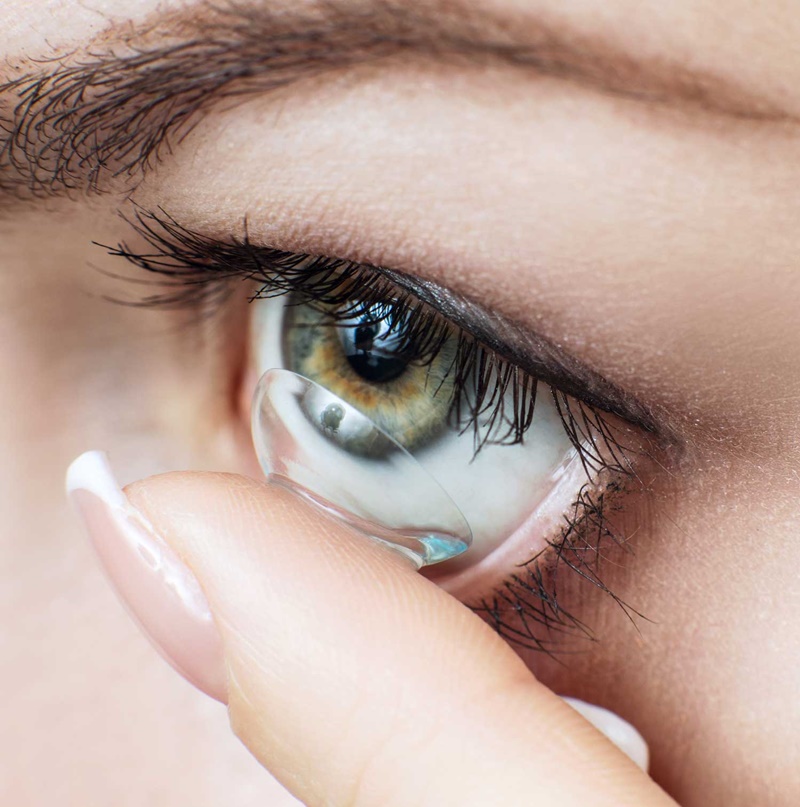Contact Lenses
Contact Lenses
Contact Lenses
At Sleeman Optometry, we strive to meet all of your eye and vision care needs. We provide corrective lens evaluations and prescription management for your contact lenses. After a comprehensive eye and vision evaluation, we will discuss the variety of contact lens options available to you, and you can select the type that best fits your vision needs and lifestyle. If you suffer from dry eye, allergies, or recurring eye infections, let us know so we can ascertain whether contact lenses are right for you.
Evaluation
We provide a thorough evaluation of your eyes and determine what level of vision correction you require. Refractive error (commonly known as nearsightedness, farsightedness, or astigmatism depending on the error) is evaluated by measuring how the eyes focus when a series of different lenses are placed in front of them.
Corrective Lenses
After determining the level of refractive error, we work with you to determine whether contact lenses or glasses are best for your lifestyle. If you suffer from certain conditions, such as dry eye or allergies, glasses may be the most comfortable corrective solution. Contact lenses are available in either soft or rigid gas permeable form. Contact lenses need to be replaced daily, weekly, bi-weekly, or monthly, depending on what type of lens you select. Specialised contact lenses, such as bifocal contact lenses, are also available for patients with special eye conditions.
Cosmetic Lenses
Advances in contact lens technology have created great options for cosmetic and prosthetic lenses. Custom contact lenses can be created to camouflage any color variation or irregularity and produce a natural eye color. Cosmetic lenses are also available to transform your eye color. Let us know if you are interested in modifying or changing your eye color with contact lenses.
Lens Types
Soft Contact Lenses
Soft contact lenses are made of soft, flexible plastics that allow oxygen to pass through to the cornea. Soft contact lenses may be easier to adjust to, and are more comfortable than rigid gas permeable lenses. Newer soft lens materials include silicone-hydrogels to provide more oxygen to your eye while you wear your lenses.
Advantages: Very short adaptation period, more comfortable and more difficult to dislodge than RGP lenses, available in tints and bifocals, available in lenses that do not need to be cleaned, great for active lifestyles.
Rigid Gas Permeable Contact Lenses (RGP)
Rigid gas permeable contact lenses (RGPs) are more durable and resistant to deposit buildup, and generally give a clearer, crisper vision. They tend to be less expensive over the life of the lens, since they last longer than soft contact lenses. They are easier to handle and less likely to tear. However, they are not as comfortable initially as soft contacts, and it may take a few weeks to get used to wearing them, compared to several days for soft contacts.
Advantages: excellent vision, short adaptation period, comfortable to wear, correct most vision problems, easy to put on and care for, relatively long life, available in tints and bifocals, available for myopia control and corneal refractive therapy.
Extended Wear Contact Lenses
Extended wear contact lenses are available for overnight or continuous wear ranging from one to six nights or up to 30 days. Extended wear contact lenses are usually soft contact lenses. They are made of flexible plastics that allow oxygen to pass through to the cornea. There are also a very few rigid gas permeable lenses that are designed and approved for overnight wear. Length of continuous wear depends on lens type and your eye care professional’s evaluation of your tolerance for overnight wear. It’s important for the eyes to have a rest without lenses for at least one night following each scheduled removal.
Advantages: can usually be worn up to 30 days without removal.
Disposable Contact Lenses
The majority of soft contact lens wearers are prescribed some type of frequent replacement schedule. Disposable, means used once and discarded. With a true daily wear disposable schedule, a brand new pair of lenses is used each day. Some soft contact lenses are referred to as “disposable” by contact lens sellers, but actually they are for frequent / planned replacement. With extended wear lenses, the lenses may be worn continuously for the prescribed wearing period (for example, 7 days to 30 days) and then thrown away. When you remove your lenses, make sure to clean and disinfect them properly before reinserting.
Advantages: require little or no cleaning, lessened risk of eye infection if wearing instructions are followed, available in tints and bifocals, spare lenses available.


